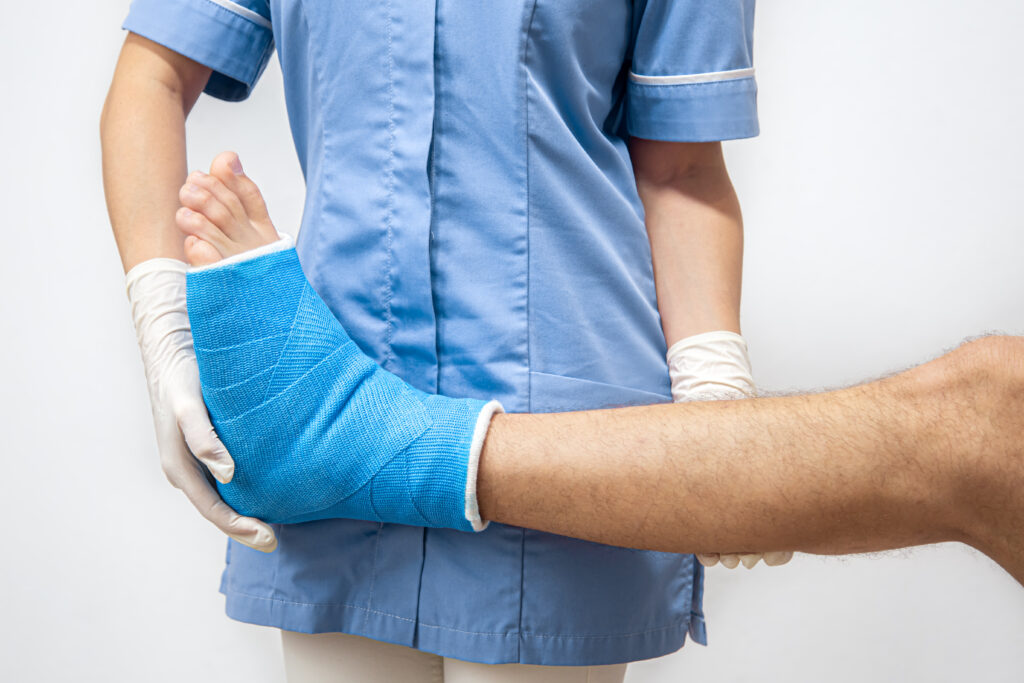Fracture and Orthopedic Surgery
We deal with all kind of fracture surgeries with best care and expertise.
We have a 24 hours emergency department available which is handled by qualified doctors, making us a preferred choice locally in case of trauma This is the quality value that VIROC offers.
Complex fractures are a result of severe trauma or other causes like heavy road traffic accidents (RTAs). Complex fractures are tough to tackle because other human body systems are closely interconnected to the bones. Expertise of doctors is required to handle such emergencies. Complex fracture involves: comminuted fractures, non-healing fractures, mal united fractures, infective fractures, periprosthetic fractures etc. Such fractures require utmost post-operative care in terms of wound care, rehabilitation, prophylaxis.
- We have surgeons available who have extraordinary experience in traumatic conditions and its management
- Infection free operation theaters (OT)
- Best post-operative care
- We have a dynamic rehabilitation team to help the patient to get back to routine as soon as possible
- Homely atmosphere during hospital stay
How long does it take a broken bone to heal?
Healing time depends on many factors, such as the blood supply to the bone, the amount of muscle and tissue near the bone, how badly it was broken, a patient’s age, and general health. Sometimes things you might not think matter will affect the bone healing, like smoking or diabetes. Most fractures require 8 to 12 weeks to heal to the point where they can be walked on. Some areas of bone heal more slowly. This is usually due to poor blood supply to these areas. Slower healing areas include: some bones in your wrist and foot, and the tibia (shin bone).
How long do ligaments take to heal?
A ligament attaches a bone to another bone. Ligaments can take several months to heal; they heal more slowly than broken bones. This is due to the relatively poor blood supply to the ligament. Every ligament is different, and some may never heal completely.
Is my wound infected?
The best place to get your wound evaluated is in your orthopaedic surgeon’s office. If they are not available, you can go to your local emergency room or primary care doctor for evaluation. They may be able to contact your doctor or another surgeon who can assist you. Always notify your treating surgeons of wound or surgical site concerns. Antibiotics may help fight the infection. Sometimes, after the antibiotics are stopped, the infection comes back. Whenever you can, keep track of the names of antibiotics you’ve taken, for how long, and if possible, your culture results.
Is my fracture healing?
The best place to get evaluated is in your orthopaedic surgeon’s office. If this process does not provide sufficient guidance, you can go to your local emergency room for evaluation. The emergency room may be able to contact your doctor or another surgeon who can assist you. Some fractures heal more slowly than others. It does not mean that your care was wrong or inappropriate. Sometimes it is hard to assess healing with x-rays, so the surgeon will need to conduct a clinical examination as well. You can ask your surgeon how your fracture is healing. If it is healing slowly, ask if there is anything you can do to help the healing process. Some things that may help include adjusting your diet or your vitamin levels, or addressing other medical issues you may have. Sometimes there is a need for another surgery to place a bone graft at the fracture site. This is common in high energy injuries and fracture of your long bones. It is also seen in some medical conditions and smokers.
How long will I be in a cast or a boot?
Broken bones are often repaired by an orthopaedic surgeon and held in place with hardware such as screws and metal plates. In that case, a cast, splint, or brace maybe used to protect the wound, or to let the soft tissue “rest” for several weeks. Some fractures are only treated with a cast, which needs to stay on until the bone is healed enough so that the cast is no longer needed. The length of time you’re in a cast or a boot is injury- and patient-specific, and the best estimate will come from your doctor.
Should I take my cast or boot off myself?
These should not be removed by you unless instructed by your doctor. In general, a cast or splint should not to be removed by anyone other than your surgeon. It is important to not cut them off yourself, as you may hurt yourself or make your injury worse. Also, do not stick things down your cast or splint. Trying to scratch an itch may damage your skin and lead to an infection or other issues with your wound. If your splint or cast is bothering you, call your surgeon as soon as possible. Sometimes, boots or splints can be removed for physical therapy, motion activities, sleeping, or bathing. You should ask your surgeon if this is okay.
What do I do if my cast gets wet?
Even a wet cast can be effective in supporting an injury. Do not try to remove it on your own or with help. The best place to get a new cast is in your orthopaedic surgeon’s office. They will know best what is needed and why. Sometimes x-rays are needed to make sure nothing has changed. Do not use a blow dryer to try and dry it out yourself. This can cause burns to the skin. Always call your orthopaedic surgeon’s office with concerns about a cast, or wound. If this does not provide sufficient guidance, you can go to your local emergency room for evaluation. The emergency room may be able to contact your doctor or another surgeon who can assist you.
What should I do if my wound or incision starts draining?
The best place to get evaluated is in your surgeon’s office. If you can’t reach them, you can go to your primary care doctor’s office or a local emergency room for evaluation. The emergency room may be able to contact your doctor or another surgeon who can assist you.
What if my pain suddenly gets worse?
The best place to get evaluated is in your orthopaedic surgeon’s office. If this process does not provide sufficient guidance, you can go to your local emergency room for evaluation. The emergency room may be able to contact your doctor or another surgeon who can assist you.
Why is my leg/ankle so swollen?
Almost every surgical patient has two injuries. The first is from the event that caused the injury. The second is from the surgery to correct the first injury. Swelling is a natural part of the injury and healing process, and it develops much faster than it goes away. Swelling around the feet and ankles often takes months to go away, since gravity pulls fluid downhill to the legs. Sometimes it never completely goes away. Even a simple fracture is not just an injury to the bone; the soft tissue around the bone is also injured. The healing of fluid channels in your injured limb involves waiting for soft tissue repair and the return of pathways through which that fluid normally returns to the heart. If you have swelling in both of your legs, it could be from other medical issues. If you have any concerns, contact your primary care doctor.
Why is my leg/ankle tingling after surgery?
Odd sensations after an injury or surgery are common, due to inflammation or swelling at the injury or surgery site. Some surgical incisions or even the injury itself can cut or stun the nerves to the skin. This can cause some numbness around the incision, and these changes can sometimes be permanent. If you feel like you had normal sensation after surgery, but things are changing for the worse, you should contact your surgeon as soon as possible. It could mean that there is too much swelling or that the bandage is too tight. If you cannot reach your surgeon, you may need to go to an emergency room to have this evaluated. It is best to ask your treating surgeon about what to expect long term.
What can I do to get to sleep at night?
It can be tough to sleep after an injury due to pain (especially at night when there are no other distractions) or because you cannot stop thinking about your injury. Some helpful tips to improve your sleep include:
- Set a routine for getting into bed and waking up, and stick to it through the week.
- If you cannot sleep, get up and out of bed after about 20 minutes and do not go back until you think you can fall asleep. Do not nap during the day.
- Ice or heat can reduce your pain. Ice helps in the immediate time after surgery.
- Limit stimulants, like caffeine and alcohol.
- At bedtime, avoid stimulating light sources like TV, computer screens, or your phone.
Sleep medications are not always the answer. They make it hard to wake up and can have unwanted side effects. These should be discussed with your primary care physician. Some medical conditions like sleep apnea can affect your sleep as well. Narcotics are not the answer to sleep disturbance and can cause issues with sleep. You should discuss your sleep concerns with your surgeon as well as your primary care physician.
How long before I can run/work-out?
The ability to fully bear weight on one or both legs without pain influences your ability to resume physical activities. Splints or casts on your arms or legs may limit the ability to exercise or use equipment safely. While it is important to remain as active as possible when recovering, it is also important to obey any restrictions your doctor has talked to you about. This may mean doing different exercises than you are used to.
It is also important to realize that when you restart activities after your injury, your muscles, tendons, and ligaments are weaker. You will not be able to lift as much or do activities for as long as before. It is important to slowly work back up the strength and endurance that you had before your injury. Further, it may be wise to start with low impact activities first; for example by using an elliptical machine or a stationary bicycle to build up strength before running on a treadmill.
Will my walking ever be the same?
One of the hardest parts of the recovery process is not knowing what to expect. Your surgeon is the best person to ask, since they understand your injuries and treatments. Sometimes walking will not be the same; sometimes it takes up to a year to find out. It’s a good idea to write down questions for your next doctor’s visit.
How long before I can return to work?
This depends on the type of work you do and your specific injuries. Jobs in which you have to be on your feet, able to lift, or perform repetitive activities usually require complete bone healing and getting your full strength and range of motion back. You may be able to return to a desk type job or work from home sooner. Please talk to your treating surgeon about your specific job to determine your limitations, when you can return to work, and in what capacity.
Our Specialist Doctors

Dr. Darshan Suthar

Dr. Chintan Parmar

Dr. Mihir Shah
Meet Our Patients


